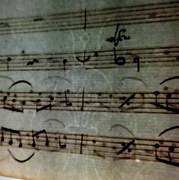Stories from Special Collections: When did "Così fan tutte" go to Detmold?
Joachim Eberhardt
Monday, May 14, 2018

The following is by Joachim Eberhardt and originally appeared on the website of the Lippische Landesbibliothek Detmold. It is reproduced here with kind permission.
This mystery came to light through a question from a researcher: In our library, there is a set of handwritten score and parts for Mozart’s Così fan tutte (shelfmark Mus-n 156) that was copied between 1810 and 1820, according to the entry in the RISM online catalog (RISM ID no. 451501513). On the score, there is a note that points to the copyist workshop of Nikolaus Simrock in Bonn. But John D. Wilson, who is working on a project at the University of Vienna concerning the music library of the Bonn court at the time of Maximilian Franz, Elector of Cologne, thinks that the score must have been copied earlier, and he asked us what we knew about its origins. The answer is: not much, because the ownership stamp of the Court Theater could only have been placed on the material after it was founded in 1825, and there are no other traces of provenance. The Detmold Court Theater project lists two performances of the arrangement Der Zauberspiegel in April 1828.
Thanks to a watermark (see image), John Wilson then narrowed the paper type down to two possibilities–both of which, however, were used in Bonn between 1789 and 1792. He also recognized the handwriting as belonging to one of the copyists who worked in Simrock’s copyist workshop around 1790. He therefore concluded that the score could have been produced before 1794 in Bonn. How did it get to Detmold, then? Wilson has two theories: The score could have been bought by the court that early. Or, it could have had a previous owner that is not noted on the material, such as from the electoral collection in Bonn; a copy of the score was supposedly once there but is no longer part of that collection.
Neither option seems that likely to me. One argument against the second theory is that there there are no further provenance marks and no convincing account of how the piece could have gotten to the court theater in Detmold. The first is questionable because nobody in Detmold would have been interested in building up a collection of performance materials before the court theater was founded.
Perhaps the score was in the possession of the principal of the theater troupe, August Pichler, after the court theater building was constructed in 1825. Hans Georg Peters (Vom Hoftheater zum Landestheater: die Detmolder Bühne von 1825 bis 1969, p. 26) tells us that Pichler made his “collection” available to the theater when he took up employment there. I also read in Peters (p. 18-19) that Pichler was born in Vienna in 1771, learned to print books, was discovered by August von Kotzebue and “found his way to the theater,” and “after rambling through Austria and southern Germany” he spent three years “around the turn of the century” as a court book printer in Bayreuth. Afterwards he took over as theater director in Bayreuth and Bamberg. Peters continues: “In 1810 he went to Northern Germany for the first time with his own troupe.” However, I cannot judge the likelihood of whether Pichler brought the performance material with him to Detmold.
Image: Watermark in the score of Mozart’s Così fan tutte, Lippische Landesbibliothek in Detmold (D-DT), shelfmark Mus-n 156. RISM ID no. 451501513. Courtesy of Joachim Eberhardt.
Share Tweet EmailCatégorie: Collections de bibliothèques

